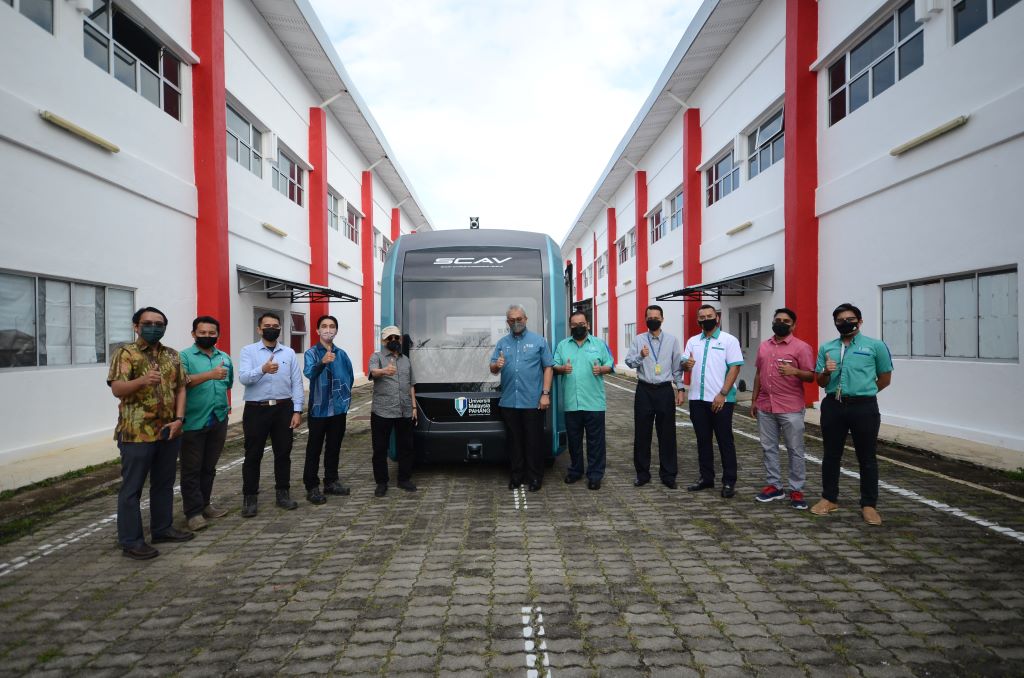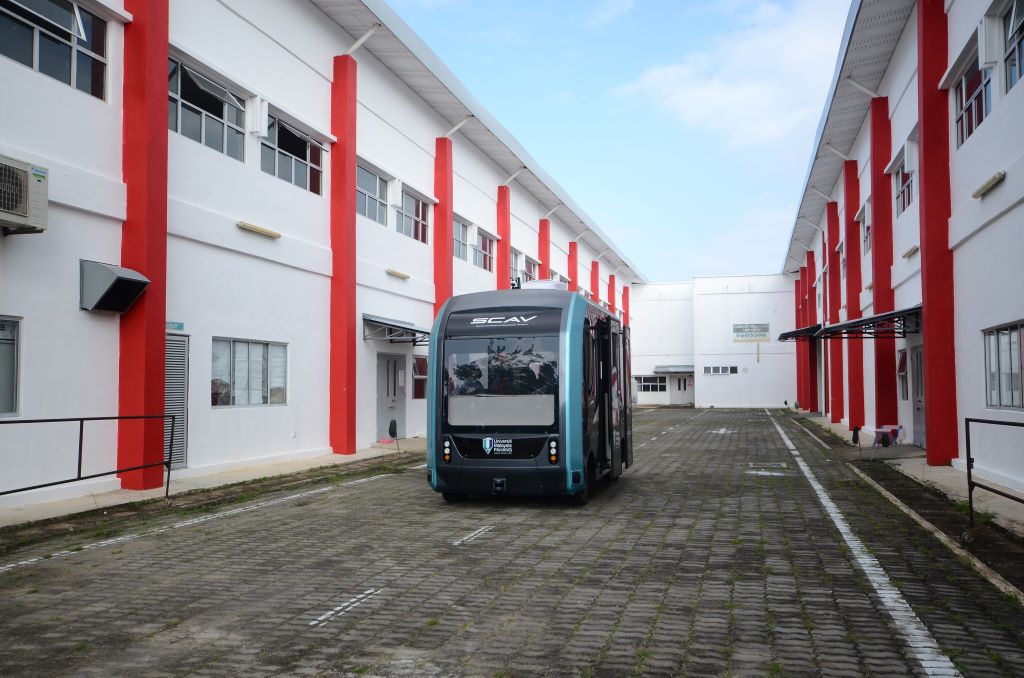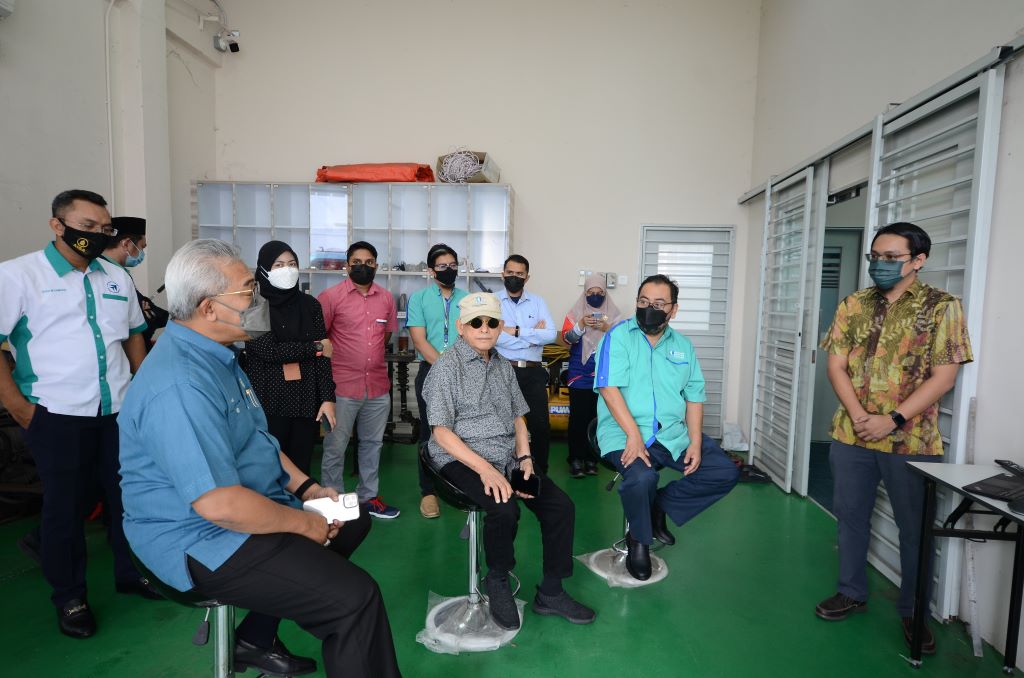UMP researchers develop SCAV self-driving bus for campus residents
With various expertise in the engineering and technology field, researchers from Universiti Malaysia Pahang (UMP) are currently developing a smart bus with a computer system to move on its own without a driver (self-driving).
The Smart Campus Autonomous Vehicle (SCAV) is equipped with various sensors and smart technology computers to move from one destination to another by itself through the control of a computer system equipped with on-campus traffic information.
The Head of Programme (Mechatronics Engineering), Faculty of Manufacturing and Mechatronics Engineering Technology (FTKPM), Ts. Dr. Muhammad Aizzat Zakaria, who specialises in self-driving car technology engineering (autonomous vehicle), said that this bus is the first self-driving bus in Malaysia developed by internal experts.
“Currently, the development process is in the final stages with 80 per cent completion and is now focusing on high-specification algorithms and technology in the bus itself.
“Some pilot tests are also carried out before it can be fully operational as a facility for campus residents, which is expected to be completed next year,” he said.
Meanwhile, FTKPM lecturer Dr. Mohamad Heerwan Peeie, who was also present at the session, presented the bus concept that was introduced as a future vehicle that contributes to environmental sustainability and improves the public transport system.
“This bus will go through a mapping process to get information on the environment en route.
“This information will be sent to a computer system to identify the position of the self-driving bus.
“Several types of sensors are used, among others light detection and ranging (LIDAR), inertial measurement unit (IMU), cameras and several other sensors to obtain information about the environment of this self-driving bus route,” he said.
They will also develop more detailed software and research to make the system more stable in more extreme conditions or uncontrolled environments.
Predicting complex situations is very important in the development of self-driving buses.
This is the most important factor for this bus to be test driven and boarded by users.
UMP researchers were present for the briefing in conjunction with the visit of the Chairman of the UMP Board of Directors, Tan Sri Dato’ Sri Dr. Abdul Aziz Abdul Rahman, which was also attended by Professor Dato’ Dr. Yuserrie Zainuddin, who is currently performing the functions of the UMP Vice-Chancellor.
Also present was the Deputy Vice-Chancellor (Research and Innovation), Professor Ts. Dr. Kamal Zuhairi Zamli.
According to Tan Sri Dato’ Sri Dr. Abdul Aziz, UMP has many talented experts and researchers in various branches of engineering, and this research can develop a flagship project for UMP.
“The outcomes of the collaboration and the expertise and trust of the university management inspire us to prove the ability of UMP researchers to develop a level four self-driving bus in a limited area (on campus),” he said.
He hoped that researchers would publish the research outcomes in the autonomous vehicle field for general reference.
Meanwhile, he was also satisfied with the building work, which also involved postgraduate students by giving them the opportunity to conduct research and practical training, monitor the progress of the project, and work with several industries to develop this bus from the beginning of building work.
The project led by the Dean of Industry Innovation UMP, Associate Professor Dr. Abdul Adam Abdullah, also receives collaboration by researchers from the Faculty of Manufacturing and Mechatronics Engineering Technology (FTKPM), Faculty of Mechanical and Automotive Engineering Technology (FTKMA), Faculty of Electrical and Electronic Engineering Technology (FTKEE), Faculty of Computing (FK) and College of Engineering (KKEJ).
To show support, the university has also set up an Autonomous Vehicle laboratory under the Centre for Automotive Engineering (AEC) for carrying out building and development work.
UMP has developed many products using some of the technologies in the bus itself, such as self-driving vehicle technology simulation software that focuses on teaching for students in the future.
The ability of the researchers proves that this technology can be explored by researchers in Malaysia in producing world-class autopilot technology.
By: Mimi Rabita Abdul Wahit, Corporate Communications Unit, The Office of The Vice-Chancellor
Translation by: Dr. Rozaimi Abu Samah, Engineering College/Faculty of Chemical and Process Engineering Technology
- 1038 views












